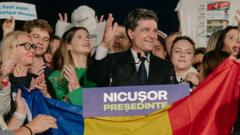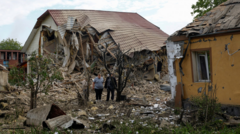This article discusses President Putin’s handling of the ongoing conflict in Ukraine, detailing his diplomatic engagements and the challenges posed by intertwined economic relationships with the United States under President Trump.
Diplomatic Manuevers: Putin's Economic Goals Amidst Ongoing Conflict

Diplomatic Manuevers: Putin's Economic Goals Amidst Ongoing Conflict
As the Russia-Ukraine war continues, President Putin's diplomatic strategies face scrutiny, balancing military ambitions with economic repercussions.
In recent weeks, President Vladimir V. Putin of Russia has been navigating complex diplomatic waters since his invasion of Ukraine in 2022. The Russian leader is intent on ending the conflict on terms favorable to Russia, engaging in negotiations for a comprehensive peace deal while concurrently pursuing military objectives that he believes are unfolding in his country’s favor.
Despite mounting pressure from Ukraine, the European Union, and previously the United States, for an immediate cease-fire prior to peace talks, Putin has maintained a robust stance. Recently, during a phone call with former President Donald Trump, the Kremlin's position was lauded as a step towards direct negotiations between Ukraine and Russia for a cease-fire and an eventual resolution of the war. This marks a significant shift, as Trump had previously asserted a commitment to rapidly ending the conflict.
While this diplomatic win may bolster Putin’s agenda, it casts shadows over his wider economic ambitions to repair relations with the U.S. Following their discussions, Trump underscored that any economic normalization with Russia would be contingent upon a resolution in Ukraine, suggesting a potential economic limbo for Russia in the interim. Putin's administration aims to foster substantial trade with the United States post-conflict, but Trump's emphasis on tying this to a peaceful outcome in Ukraine could confine Russia economically and prolong the impact of Western sanctions.
Putin has indicated that the Kremlin is not daunted by additional sanctions, expressing confidence in Russia's ability to adapt to new economic pressures. As diplomatic dialogues unfold while the war continues, the balancing act between military strategy and economic viability remains crucial for the Russian leadership as they navigate the complexities of international relations in a time of strife.
Despite mounting pressure from Ukraine, the European Union, and previously the United States, for an immediate cease-fire prior to peace talks, Putin has maintained a robust stance. Recently, during a phone call with former President Donald Trump, the Kremlin's position was lauded as a step towards direct negotiations between Ukraine and Russia for a cease-fire and an eventual resolution of the war. This marks a significant shift, as Trump had previously asserted a commitment to rapidly ending the conflict.
While this diplomatic win may bolster Putin’s agenda, it casts shadows over his wider economic ambitions to repair relations with the U.S. Following their discussions, Trump underscored that any economic normalization with Russia would be contingent upon a resolution in Ukraine, suggesting a potential economic limbo for Russia in the interim. Putin's administration aims to foster substantial trade with the United States post-conflict, but Trump's emphasis on tying this to a peaceful outcome in Ukraine could confine Russia economically and prolong the impact of Western sanctions.
Putin has indicated that the Kremlin is not daunted by additional sanctions, expressing confidence in Russia's ability to adapt to new economic pressures. As diplomatic dialogues unfold while the war continues, the balancing act between military strategy and economic viability remains crucial for the Russian leadership as they navigate the complexities of international relations in a time of strife.





















